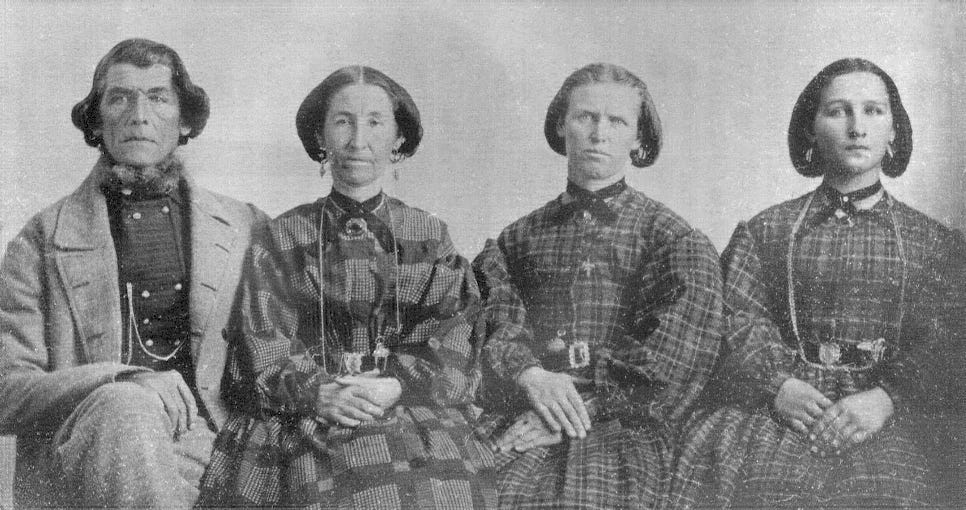An acquaintance of mine, Sister Doe,* shared an interesting story about her experience in a recent temple sealing. At the end of the ceremony, the sealer gave a few words of advice, including this gem to the bride:
“You are now the groom’s ticket to his full exaltation, like a visa on a passport.”
Sister Doe gave him a withering look in return and should be commended for not standing up and flipping the over-priced chairs.
As if the sealing ceremony itself wasn’t sexist enough, he had to add insult to injury by reminding the young bride that doctrinally, she was only an object—a means to a man’s eternal salvation.

In the 19th century, the LDS church practiced plural marriage, or polygamy. Men married an average of 2-3 wives each, though some leaders had as many as 50. Regarding this principle, Doctrine & Covenants 132 states:
61 And again, as pertaining to the law of the priesthood—if any man espouse a virgin, and desire to espouse another, and the first give her consent, and if he espouse the second, and they are virgins, and have vowed to no other man, then is he justified; he cannot commit adultery for they are given unto him; for he cannot commit adultery with that that belongeth unto him and to no one else.
62 And if he have ten virgins given unto him by this law, he cannot commit adultery, for they belong to him, and they are given unto him; therefore is he justified.
This scripture––which is still canonized––hinges on men as agents and women as objects, something to be received, given, and owned. Even the idea of a woman giving her consent isn’t really true only two verses later:
64 And again, verily, verily, I say unto you, if any man have a wife, who holds the keys of this power, and he teaches unto her the law of my priesthood, as pertaining to these things, then shall she believe and administer unto him, or she shall be destroyed, saith the Lord your God; for I will destroy her; for I will magnify my name upon all those who receive and abide in my law.
Women who refuse to give consent to polygamy will be destroyed. How can women be true agents when they are told they must consent or face destruction? Women are something to be collected, told what to do, and obey. They are given in marriage and received like a present or a prize.
In the doctrine of plural marriage, men are required to be married in order to receive exaltation and achieve godhood. As Brigham Young taught: “The only men who become Gods, even the Sons of God, are those who enter into polygamy.” A woman—a plural wife—is a literal ticket to heaven for men.
Or to put as plainly as Heber C. Kimball: “I think no more of taking a wife than I do of buying a cow.”

Marriage is still required for eternal exaltation and the Celestial Kingdom. Russell M. Nelson taught, “Only those who are married in the temple and whose marriage is sealed by the Holy Spirit of Promise will continue as spouses after death and receive the highest degree of celestial glory, or exaltation.” While the language used now is more equal, stating both men and women must be married to obtain it, a wedding is still treated as a forced pit stop on the road to heaven.
(Believing that marriage is required for salvation brings in tricky doctrinal questions too, like how much does the atonement matter if a gospel of works is required? What of grace? Why wasn’t Christ married or at least preach of marriage in the New Testament? But these questions might best be explored in another post.)
Celestial marriage. The fulness of the gospel. The new and everlasting covenant.
These were all code words for polygamy that we still use today. We’ve renegotiated their meaning to just be temple marriage, but that doesn’t mean the roots don’t fester beneath our feet. Plural marriage exists in Mormon heaven. Both President Nelson and President Oaks are married polygamously, believing that they will be with both wives in the next life. There is controversy over whether or not polygamy is required for us to practice in the next life. I grew up being told that I would practice polygamy one day and “love it.” Others never heard such a thing until they stumbled across it on the internet. But I think that’s one of the worst parts about it.
The modern day church has never stated one way or another what the requirement of polygamy will be in the next life. We are cautioned not to speculate or perpetuate rumors, but wouldn’t it make the most sense for the church to just clarify it themselves? Why leave room for rumors in the first place? Simply state unequivocally that polygamy is not an eternal requirement and that women don’t need to lie awake at night fearing an eternal future they know next to nothing about.
But they can’t do that, can they? That would be admitting the ugly truth—that plural marriage was a farce. That it led to abuse, poverty, and broken people. That it helped consolidate structural power into the hands of a few men in a tradition that continues today.
And it would make women agents, not objects: in marriage, in the family, and in church structure.
If women are more than something you collect like tokens to cash in for celestial godhood, then they have the right to say no. To take power. To be in charge of themselves. If we keep that subtle confusion and cultural belief of women as things, equal but also presided over, then they can’t become too powerful to control and bind to otherwise mediocre Mormon men that they wouldn’t be attracted without the priesthood. If the quiet sexism and inequality didn’t exist, then who would populate men’s earthly and eternal kingdoms with children?
When a woman boils down to an object, her consent means nothing. Her opinions and desires are easy to trample or twist into what men want them to be. When a woman is something a man needs to be a god, what stops him from believing that he is a god now, ruling and reigning without consequence or question? When a woman is requirement you must collect like a passport stamp, then the seeds of abuse are fertile for growth.
If I was Sister Doe in that sealing room, I might not have had the control to not scream out loud or break down into loud sobs. I’d probably have to be escorted out before I smashed a mirror. These small thoughts, comments, or jokes are where inequality lives and thrives. This is where women are turned into trinkets. These are the messages we absorb week after week, sermon after sermon, until we forget our own power.
But I am not an object. I’m not a prize for men to cash in for because they served a righteous mission. I’m not a passport to a man’s godhood that isn’t offered equally to me. I’m with Sister Emma—I resist even if they call me rebellious. My Heavenly Mother will not destroy me.
*Name changed at their request to protect privacy.






11 Responses
“My Heavenly Mother will not destroy me.” 👊🙌❤️🔥
This is one of the strongest and most lucid things I’ve seen written about polygamy and how it continues to distort the gospel and our religious perspectives and experiences today. Thank you so for putting these thoughts and arguments together. I love how you use this disturbing real-life sealing experience to frame the essay. I appreciate how you dig into the nitty gritty of the huge, damaging issues 132 and how they continue to impact the Church today. I especially love how you point out how decanting polygamy properly would require the Church to reckon with gender inequality and its objectification of women and misogyny, and this is likely part of why this hasn’t happened. Men don’t want to give up the reigns or acknowledge women as agents before God who are equal to themselves.
I also appreciate the title and the points about women being tickets to heaven for men. When I watched “Keep Sweet, Pray and Obey” on Netflix, I was fascinated by this FLDS idea that men had to have 3 wives to enter the celestial kingdom. I was struck by how so much of what FLDS people teach and believe are exactly the same things passed down to me by LDS teachers. As you point out, our leaders have never properly grappled with the dissonance between teachings back then (polygamy = absolutely necessary for exaltation, if you don’t submit, be damned and destroyed!) and teachings now (polygamy is an exception, apparently some people will live it someday, God won’t force us to stay sealed, but your husbands can marry additional people for eternity when you die).
When I entered a temple for the first time, I was really drawn to the brides’ room. It was pretty and pink. I was only about ten years old and was at an open house. But then I remembered how people at church and in my family had taught me to expect to be a polygamous wife in eternity. This is what womanly righteousness and true unselfishness looked like. What sanctification and pleasing God looked like. Nothing could be kept just to yourself, even a sexual life with your husband or being uniquely loved. Nothing could have been less inspiring when it came to becoming like God. I realized that the brides’ room was in reality a room that beckoned me to celebrate polygamous romance, something I sensed even at that time was a total oxymoron and impossibility. I could have vomited as I continued gazing in that pristine room.
Polygamy hurt my relationship with the temple, my relationship with God, my relationships with my family, and the early years of my marriage. I’m not that old, I was born in 1984. A lot of people are complacent about it continuing to have an honored seat at the table of the gospel, they think it is long gone, but all is not at all well in Zion. Polygamy needs to be burned down all to the way to the roots while we salvage the things that are actually pure, good and that bring peace and joy.
Thank you for your thoughtful comment! I agree with you so much. I was born in 1988 and I was taught plenty of times growing up at church that I would be a polygamist. I think I pushed it to the back of my head so I wouldn’t have to confront it, but it became very real for me when I got engaged. I think most members do that and then pretend it’s not a worry because it’s “gone.” But it’ll never be gone until it actually dealt with.
This essay brought up memories of the brides room for me too. In the salt lake temple there is a tradition- that I didn’t know about- that the bride doesn’t dress herself. The mother is supposed to dress the bride. I went into a private stall and dressed myself and the temple workers were aghast when I came out ready to go. I knew it then, but I’m just finding the words for it now, how infantilized women are in Mormon culture. Somehow as a 25 year old woman I wasn’t capable of even dressing myself, or rather of having the choice of how I wanted to get dressed for my wedding. So many bizarre and harmful traditions have been passed down and I’m grateful to grow into a more adult understanding of myself and what agency really means.
All of this! Salvific Coverture (coined by Brooke LeFevre) persists in too many places in the church.
Brooke is amazing and I love that she gave us this name for it. It’s everywhere and once you see it, it’s impossible to unsee it.
While trying to explain my hesitancy with certain aspects of the doctrine (Ahem, Eternal Polygamy), I explained how unfair it was that if I die before him and he is sealed to someone else, I am now forced into a polygamous relationship or leave the man I love and built a life with. His platitudes–don’t worry about an unknown future that may or may not be (I only do because this is the trauma passed down to me), I just won’t ever be sealed to anyone else (unless some future ancestor does the work for us), OR if I do then you have a choice to stay or leave (what an unfair choice to be forced to leave the person I created a family with). And The afterlife is so different you might not even have a problem with it.
He says he just doesn’t think about it. He doesn’t want it either and it’s not an important part of the gospel to him. On one hand, I agree. I do not believe we know anything about the afterlife. I have a very different view of heaven than the one I was taught in Sunday School since my faith reconstruction. However, it is very important to me because it is part of my upbringing. I have hated polygamy since I first read D&C 132 at about age 10 and realized I would be destroyed (assuming it all was true) because I would never allow it. So I can’t leave it alone because it is part of me even though I don’t want it to be.
My husband says the same thing. He doesn’t see any need to worry about it, look into it, pray about it, wrestle with it, etc. because he’s not being asked to live it now. So, out of sight, out of mind… That is his privelage as a man in this church. I told him that women don’t have that privelage because it actually does affect us here and now, even if we’re not asked to currently live it. When we have canonized scripture that paints a picture of a merciless male God who sees and treats women as objects without true agency and threatens to destroy if they don’t comply with what his Book of Mormon prophet Jacob calls an abomination, and is in direct contradiction with the God Jacob depicts, this issue goes to the very heart of the nature of God and God’s relationship with women. What is the true nature of God? How does God view me, a woman? What is my nature as a women? Is it actually divine? Do I, as a woman, actually have agency? Does God actually care for *his* daughters at all? With the legacy of polygamy still woven throughout the temple, with the current language still unequal, with our prophet and soon-to-be prophet giddy about their eternal polygamous wives, this is something women are living with here and now. I, as have so many women, eventually had to wrestle with it and I came to the conclusion (God revealed to me) that it’s all bunk. So I don’t live in anxiety over the prospect of eternal polygamy anymore because I believe that’s just the fantasy of entitled men, not God’s (Their) design. But I am annoyed and sometimes angry that the Church refuses to deal with this and the unequality persists. I have about 2% confidence that men in leadership will ever bother fixing this because it’s their privelage not to.
You are theologically sharp on this issue and I appreciate your voice. We try to minimize polygamy as much as possible. The justifications might sound reasonable but are actually not. If it’s hanging over us snd burdening us, it matters here and now. It’s a huge obstacle to a healthy relationship with God and one’s own spirituality. Rising generations have increasing dissonance w leaders who affirm polygamy, but I fear the pattern is they are not jnterested in staying attuned to the changing needs and perspectives of young people. Overconfidence is one of their vices. They are going to loose so many of them, and better educated people and people with better emotional health and more resources won’t stick around as much as in the past.
Hot damn that was a good essay. Amen to absolutely all of it. I especially enjoyed how you pointed out the silence on the part of the church regarding plural marriage in the afterlife speaks volumes about what today’s “celestial marriage” really means for women. They’ve tried to obscure the theology underlying all of this in the 2019 and 2023 revisions to the endowment liturgy, but if you track the changes over time it becomes clear as day what is the intended role for women in the temple cosmology.
Keep writing! Really looking forward to your future essays.
My daughter’s YW leader was widowed a few years ago and just got remarried, so naturally she had questions about weddings and sealings. Dang, it’s one thing to wrestle with this stuff yourself … it’s entirely another to have to explain it to your fourteen-year-old daughter. I found myself skirting around things and I probably need to address it more directly. Not that I know what to say. I suppose I could tell her that I don’t believe in this principle that’s been lived and taught by prophets from Joseph down to Nelson. Obviously that puts me at odds with the Church. But should I instead let my daughter wonder if she will be subservient to her husband, an object in the game of polygamy? It’s an impossible situation — and it’s one that church leadership should have cleared up years ago. Instead, women are made to live in fear that this will be their eternity and guilt for not being humble enough to accept it.